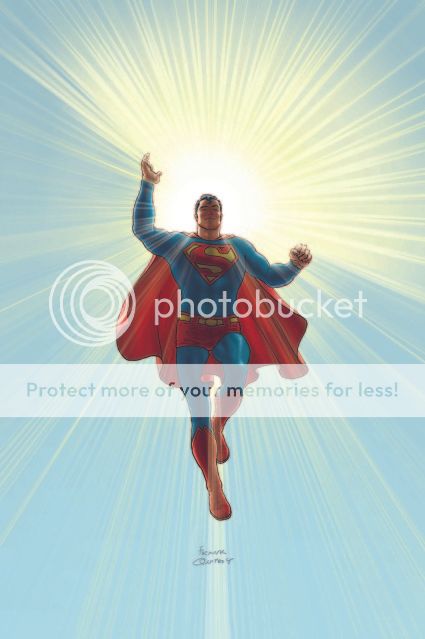* Jeet Heer discusses Dan Nadel’s new mostly action-oriented anthology Art in Time and makes the following very-worth-discussing point:
But Dan wants to shake up our sense of history. I’ve taken the issue up with him during a panel in TCAF and he’s made the point elsewhere as well but in essence he’s challenging the view of old fogeys like me who see a major epistemological break between the world of commercial comic books and the world of the undergrounds. For Dan, it is all comics, and the formal properties that unite Marsh and Sharon Rudahl (for example) outweigh the social, cultural and economic divide.
[…]
Still, and this might be a testimony to my age and the extent that I was formed intellectually in the 1980s when the divide between commercial comics and the alternative press was especially large, I’m not sure I fully buy the argument Dan is making in Art In Time. It seems to me that the undergrounds did represent a fundamental break with the past. I’m not sure if I can define it in words, but the best underground comics (Crumb, Deitch, Spiegelman, Justin Green) cut deeper into human experience than any of the commercial cartoonists, no matter how good they were, ever did. The experience of reading an underground comic is different from reading a commercial comic book. Even with the best commercial comics, you have to make allowances or read between the lines to find the spark of individuality.
Man, there’s some heavy stuff going on in there. I think it’s pretty clear that from a critical-consensus standpoint, Heer has lost this particular argument. In large part, the task of the ’00s in both critical and comics-making terms was reclaiming commercial and genre comics as subjects worthy of investigation and capable of holding their own with the art/lit/underground end of things. Obviously, in his dual role as both critic and publisher, Nadel arguably represents the apotheosis of that viewpoint.
* This argument of course has parallels with poptimism vs. rockism in music criticism; nowadays you couldn’t possibly say that “the best underground music cut deeper into human experience than any of the commercial musicians” without being laughed off of Tumblr, and rightly so, because that’s a ridiculous statement. (I understand that the music and comics industries of the mid-20th century aren’t directly analogous, but that’s why we have analogies.) And of course this isn’t very different from the critics who fought for the legitimacy of rock and roll, or jazz, or from the Cahiers crowd taking Hollywood seriously as art, and on and on and on.
* (It’s worth considering, of course, that the reason people like Nadel, or me, can treat genre and commercial comics seriously is because the previous generation of critics fought so hard against genre and commercial comics to make room for alt/art/lit/underground books in the discussion. With that work done, we can go back and fill in the gaps. Nadel’s compatriot Tim Hodler said as much at SPX a while back.)
* All that being said, what I worry about as the next generation of critics comes up is that the availability of genre/commercial comics to them in terms of something that’s seen as okay to talk about seriously is once again crowding out the conversational space for nongenre/noncommercial comics. Pop quiz: Can you name more than one critic who writes mostly, or even often, and well about alternative comics who wasn’t already doing so three years ago? I think there’s a fairly large generation gap in terms of who’s talking about what, especially in internet terms.
* (NB: It’s entirely possible I’m an insulated idiot who’s missing out on someone totally obvious and awesome, so it’s worth noting that this is not a rhetorical question. If I’m being stupid, help me be less stupid.)
* Related, in some way: Stereogum assembled a fascinating artists’ roundtable on art-pop duo CocoRosie’s latest album Grey Oceans, the gist of which is essentially that dude-ism is preventing people from taking the band as seriously as they should be taken. To a certain extent I think this is seeing hoofprints and thinking “zebra”: The woman with the mustache’s voice is certainly an acquired taste, and I’m sure that’s what turns a lot of people off of the band. (Also, the indie-rock press is always super-excited to throw accusations of racism/sexism/homophobia/classism at itself, which is oddly hilarious to me.) But what CocoRosie does is not soooooooo weird that it’s not within the boundaries established by countless other weirdos in the indie-rock world, and moreover no one’s making the argument that the masses are unfairly ignoring the band–they’re saying this is being done by critics, who in theory ought to be able to handle ’em. Indeed it’s weird to me that the consensus hasn’t lined up in their favor beyond the usual “naw, this isn’t for me” responses anything gets. I think there’s something to that, and I wanna say that the one commenter who explodes with rage and flings around phrases like “these sisters stink like bullshit” is an indication that the roundtable hit a nerve. (No, not in the comic-convention-panel “if people hate it, then good, we’re doing something right” way…it’s just clear all sorts of baggage and preexisting resentment is being brought to the table, as is the case nine times out of ten when a critic substitutes anger for insight.)
* Also related, maybe? James Murphy of LCD Soundsystem on artists and age:
Pitchfork: Okay, you’re old. How do you think your age informs your music?
JM: I think it’s a huge part of it. I’ve kind of been thinking about this a lot lately. Because for a while I was really angry. ‘Cause I was like, “What the fuck? We should suck. We should be being wiped off the stage by kids every night.” I just didn’t get it. I spent years saying that and being kind of wound up. Like, where the fuck are the kids? Then I started thinking that energy that used to be kids– early rock and then punk, what was really going on was that there was no marketing to kids.
If you made advertisements, you made them to 40- or 50-year-olds. Because they had money, they had jobs. You didn’t advertise to kids. The only thing that was targeted to kids was like, funny hair products and rock’n’roll. So you had this one thing to navigate, and that was where all your energy was.
But now kids buy shit. They really buy shit. Kids buy designer stuff. So you’re being constantly pounded by marketing. And if you want to be a rebel, well, there’s rebel clothing companies. There’s rebel stick-on tattoos. You can get a rebel skateboard. You just pick your rebel mode and there’s a whole online shopping network that you can be a part of. So kids may look punk or feel punk, but what they’re kind of doing is the same as like, being really swept up in high school sports or something. But when I was a kid, you didn’t know. I was like, “I guess Kraftwerk is punk?” I remember I got Sex Pistols, Kraftwerk’s Computer World and Venom on the same day. And I thought it was all punk. It was just everything that was weird. Everything that wasn’t Bruce Springsteen– who turns out to be a lot punker than I thought at the time.
So I just think it takes a couple decades to kind of clear your brain now. So it makes more sense to me that I could find my footing when I was 30 instead of when I was 19. It seems a little more clear. You know, novelists are older now. Things are happening later in people’s lives. They’re kind of living lives and then creating things about the lives they’ve lived. Rather than being an artiste at an early age and coming out with a ball of fire. That energy has been co-opted because you haven’t immunized yourself yet against media. It’s easier to get swept up things then take a couple of years to get over your, like, indie rock hangover. I’m scraping the fucking Quarterstick Records crust out of my eyes when I’m like, 27. You know, “Why am I playing in 5/7? How is that fun?”
* My chum Kiel Phegley interviews DC Comics co-publishers Jim Lee and Dan DiDio for CBR.
* On Robot 6 I pulled out a couple of passages that struck me: One in which DiDio pushes back against the outcry over the death of the Asian-American Atom, Ryan Choi by saying in part “to focus on one book, one issue, is doing a true disservice to the company, the comics and to the industry”;
* and one in which DiDio and Lee discuss their interaction with Vertigo.
* I think it’s worth reading Ben Davis’s piece on Brian Chippendale’s show at the Cinders Gallery for the Village Voice and Kurt Shulenberger’s piece on Super Mario Galaxy 2 for The House Next Door in tandem. I think the Mario games may be the single most underdiscussed work of art of the past 30 years relative to their innovation, influence, and fecundity. (Chippendale link via Heidi MacDonald.)
* Ron Rege Jr. explains how the aptly named Yeast Hoist #15 is both a comic and a beer.
* Anders Nilsen proposes some things to consider.
* Frank Quitely says “Subtext? What subtext?” on the cover for Absolute All-Star Superman.
* Marvel must be quite pleased with the sales for Avengers #1.
* I really dug the way Tucker Stone broke down what’s appealing and unappealing alike about Amazing Spider-Man since it went almost-weekly in his piece on Savage Critics from a couple days ago. It’s certainly worth reminding ourselves of the parade of massively talented artists that’s traipsed in and out of that series over the past couple of years.
* Immune though I am to the ring-a-ding-ding Rat Pack nostalgia that is Darwyn Cooke’s bread and butter, I nonetheless got a lot out of Matt Seneca’s unpacking of Cooke’s work through a single Parker panel.
* Here’s a nice little piece by Shawn Despres in the Japan Times about glo-fi/chillwave, my favorite microgenre since electroclash. (Via Mark Hogan.)




That Superman cover is glorious. Literally.
I’m trying to figure out if it would be stronger or weaker with a Frank Miller-style silhouette treatment instead of the softly glowing color palette.